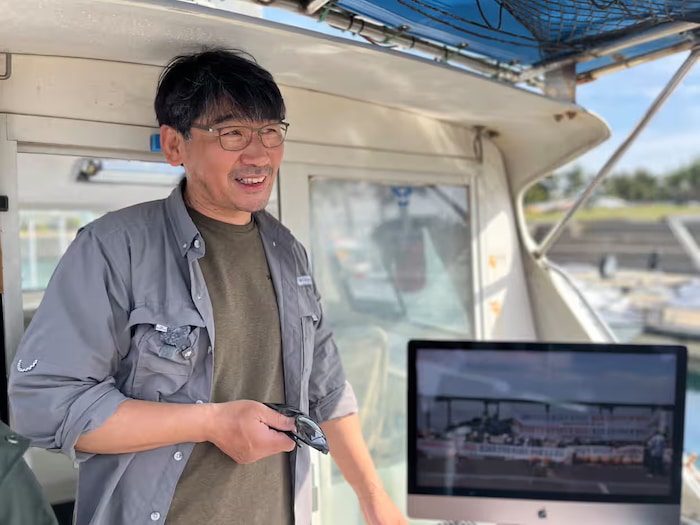A
dolphin
off
Jeju
Island,
South
Korea.
Jeju
Tourism
Organization
/
Facebook
Why
you
can
trust
us
Founded
in
2005
as
an
Ohio-based
environmental
newspaper,
EcoWatch
is
a
digital
platform
dedicated
to
publishing
quality,
science-based
content
on
environmental
issues,
causes,
and
solutions.
Bottlenose
dolphins
living
off
the
coast
of
South
Korea’s
Jeju
Island
are
threatened
by
boats,
discarded
fishing
gear,
construction
noise,
pollution
and
runoff
from
fish
farms.
But
a
group
of
the
country’s
environmentalists
and
experts
are
campaigning
for
the
dolphins
to
be
given
“legal
personhood”
status
to
better
protect
them.
It
is
the
first
attempt
by
Korea
to
give
an
animal
the
status,
and
is
part
of
an
expanding
movement
to
recognize
the
legal
rights
of
nonhuman
species.
“Since
2023,
Jeju
island’s
government
has
been
working
to
introduce
Korea’s
first-ever
‘eco
legal
personhood’
system
to
protect
Jeju’s
environmental
and
ecological
values
and
‘set
a
new
standard’
for
domestic
ecological
and
environmental
policies.
In
order
to
introduce
the
environmental
personhood
system,
Jeju
has
been
operating
a
working
group
composed
of
academics,
lawyers,
and
experts
to
come
up
with
a
proposal,”
a
press
release
from
Eco
Jurisprudence
Monitor
said.
[embedded content]
The
proposed
amendment
to
an
existing
law
would
recognize
the
Indo-Pacific
bottlenose
dolphin
as
“eco-legal
entities,
granting
them
certain
rights
and
legal
protections
to
ensure
long-term
ecological
sustainability.”
The
amendment
would
also
require
the
formation
of
a
committee
to
advocate
for
and
protect
the
dolphins’
rights,
as
well
as
establish
funding
mechanisms
to
support
the
protections.
An
estimated
120
Indo-Pacific
bottlenose
dolphins
make
their
home
in
the
waters
off
Jeju
Island,
according
to
a
press
release
from
Korea’s
Ministry
of
Culture,
Sports
and
Tourism.
Many
of
them
have
visible
scars
from
being
entangled
in
fishing
gear
or
from
being
struck
by
boats
and
jet
skis
that
speed
through
the
waters
surrounding
the
island.
“Because
the
dolphins
cannot
cut
the
fishing
lines
themselves,
we
decided
to
cut
them
for
them,”
said
Jeongjoon
Lee,
a
Korean
director
known
as
“Dolphin
Man,”
as
The
Guardian
reported.
Lee
is
known
for
his
work
helping
and
documenting
Jeju’s
bottlenose
dolphin
population.
“In
one
case,
we
had
to
cut
wire
from
two
different
places,
one
was
going
in
through
the
dolphin’s
face
to
its
body,
and
another
from
around
its
tail
where
it
had
become
tangled,”
Lee
said.

Jeongjoon
Lee,
known
as
“Dolphin
Man.”
Young
Nam
Kim
/
Korea
Marine
Environment
Management
Corporation
Miyeon
Kim,
who
works
with
local
NGO
Marine
Animal
Research
and
Conservation
(MARC),
said
the
purpose
of
giving
the
dolphins
legal
personhood
status
is
for
advocates
to
be
able
to
take
action
on
their
behalf
if
a
company
or
individual
threatens
their
livelihood.
“The
endangered
Indo-Pacific
bottlenose
dolphin,
which
has
lived
harmoniously
with
the
haenyeo
(female
sea
divers)
in
Jeju
waters,
is
an
important
species
that
requires
protection,”
said
Governor
of
Jeju
Oh
Young-hoon
in
the
press
release
from
the
ministry.
“With
supporters,
the
Jeju
government
will
do
its
best
to
pass
a
revision
to
the
Special
Act
on
the
Establishment
of
Jeju
Special
Self-Governing
Province
and
the
Development
of
the
Free
International
City
to
designate
Korea’s
first
eco-legal
person.”
Indo-Pacific
bottlenose
dolphins
are
listed
as
“near
threatened”
on
the
International
Union
for
Conservation
of
Nature
(IUCN)’s
Red
List
of
Threatened
Species,
reported
The
Guardian.
However,
IUCN
said
lack
of
data
on
the
species
makes
it
hard
to
determine
if
the
status
is
accurate.
Kim
said
one
of
the
strategies
MARC
uses
to
protect
the
dolphins
is
to
personalize
them,
so
that
local
people
can
better
relate
to
them.
The
group
produced
a
booklet
displaying
a
photograph
of
each
dolphin’s
dorsal
fin
with
their
name.
“It’s
important
for
us
to
be
able
to
identify
individual
dolphins
to
be
able
to
record
scientific
facts
but
it’s
also
important
for
the
islanders.
People
have
to
understand
and
really
relate
to
endangered
species
in
order
for
these
[kinds]
of
things
[establishing
legal
personhood]
to
work,”
Kim
said,
as
The
Guardian
reported.
In
April,
a
marine
protected
area
was
designated
on
the
west
side
of
Jeju
island
to
safeguard
the
dolphins.
Kim
said
current
rules
governing
the
area,
like
preventing
arbitrary
development,
need
to
be
strengthened.
“The
law
bans
more
than
two
recreation
boats
coming
within
a
100-metre
radius
of
the
dolphins
but
there
are
a
lot
of
different
boats
in
that
area
including
fishing
boats,
and
at
the
moment
we
can’t
do
anything
about
those,”
Kim
explained.
Lee
has
spent
a
lot
of
time
with
the
dolphins,
swimming
alongside
them,
providing
help
when
needed
and
filming
them.
He
said
additional
conservation
measures
couldn’t
come
fast
enough.
“Sometimes
I
see
so
many
boats
surrounding
the
dolphins
all
watching
them
and
chasing
them
around,”
Lee
said.
“It
is
good
that
we
now
have
a
small
space
to
begin
to
protect
them
more,
but
really
we
need
to
designate
that
whole
side
of
the
island
as
a
protected
area
in
order
to
keep
them
safe
for
the
future.”
[embedded content]
Subscribe
to
get
exclusive
updates
in
our
daily
newsletter!
By
signing
up,
you
agree
to
the
Terms
of
Use and Privacy
Policy,
and
to
receive
electronic
communications
from
EcoWatch
Media
Group,
which
may
include
marketing
promotions,
advertisements
and
sponsored
content.





